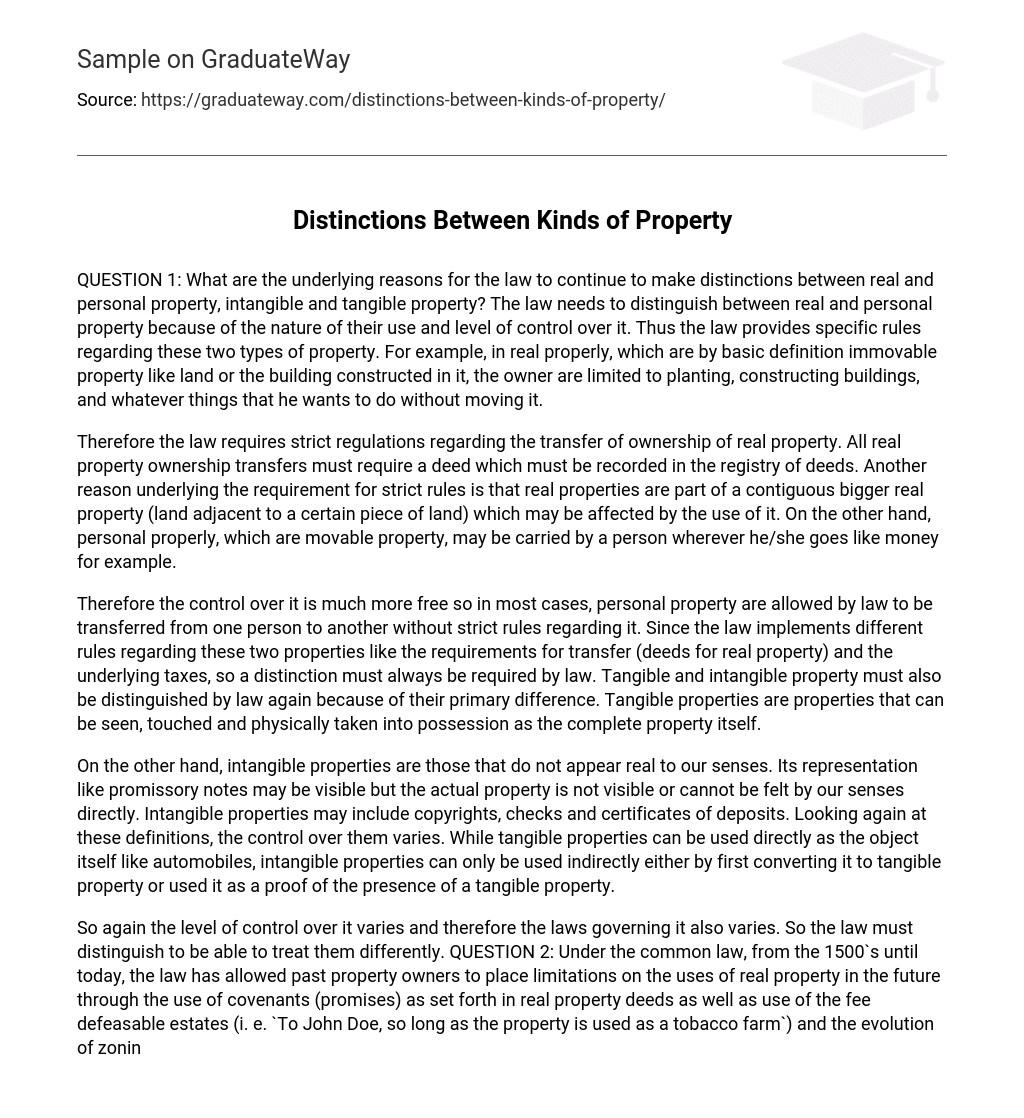QUESTION 1: What are the underlying reasons for the law to continue to make distinctions between real and personal property, intangible and tangible property? The law needs to distinguish between real and personal property because of the nature of their use and level of control over it. Thus the law provides specific rules regarding these two types of property. For example, in real properly, which are by basic definition immovable property like land or the building constructed in it, the owner are limited to planting, constructing buildings, and whatever things that he wants to do without moving it.
Therefore the law requires strict regulations regarding the transfer of ownership of real property. All real property ownership transfers must require a deed which must be recorded in the registry of deeds. Another reason underlying the requirement for strict rules is that real properties are part of a contiguous bigger real property (land adjacent to a certain piece of land) which may be affected by the use of it. On the other hand, personal properly, which are movable property, may be carried by a person wherever he/she goes like money for example.
Therefore the control over it is much more free so in most cases, personal property are allowed by law to be transferred from one person to another without strict rules regarding it. Since the law implements different rules regarding these two properties like the requirements for transfer (deeds for real property) and the underlying taxes, so a distinction must always be required by law. Tangible and intangible property must also be distinguished by law again because of their primary difference. Tangible properties are properties that can be seen, touched and physically taken into possession as the complete property itself.
On the other hand, intangible properties are those that do not appear real to our senses. Its representation like promissory notes may be visible but the actual property is not visible or cannot be felt by our senses directly. Intangible properties may include copyrights, checks and certificates of deposits. Looking again at these definitions, the control over them varies. While tangible properties can be used directly as the object itself like automobiles, intangible properties can only be used indirectly either by first converting it to tangible property or used it as a proof of the presence of a tangible property.
So again the level of control over it varies and therefore the laws governing it also varies. So the law must distinguish to be able to treat them differently. QUESTION 2: Under the common law, from the 1500`s until today, the law has allowed past property owners to place limitations on the uses of real property in the future through the use of covenants (promises) as set forth in real property deeds as well as use of the fee defeasable estates (i. e. `To John Doe, so long as the property is used as a tobacco farm`) and the evolution of zoning statutes and practice.
Thomas Jefferson argued vehemently that no past owner of real property (dead or alive) should be allowed to restrict a future owner of real property concerning its present use; however, the Virginia State Legislature disagreed with him and land use limitation continues today. Jefferson described this practice as `Allowing the dead to control the lands of the living. Was Jefferson right, or should we maintain the practice of allowing past property owners to place land use limitations in deeds of lands sold or gifted?
Jefferson is right because the future use of the land normally depends on the future environment around it. There is no way for a dead man to know what would be the best use of a land in the future unless he can foretell the future when he was alive. With this argument, the present owner should not be limited by a past covenant because environment can evolve and so thus the best use of the land within a certain environment. Further, should the government be allowed to determine how a private property owner uses his/her respective land?
The government should not be allowed to determine how a private property owner uses his/her respective land. Otherwise this will be in violation of the freedom of the owner. If the government wishes to use a piece of land for a much greater purpose, then the government must first apply ownership of a private property. If the law guarantees with due process that the acquisition is for a greater purpose, then the private owner cannot hold on to the ownership of the land unless he can prove otherwise.
An example is if the government wishes to use a piece of land and convert it to an airport or a public transportation road, then the government must purchase this piece of land from the owner. Unless of the course the private use of a land violates other laws like planting of prohibited plants or doing experiments that are prohibited, then the owner can be stopped by the government from using the piece of land in such a purpose. Another case is if the use the land can be detrimental to the environment near it then the government may stop the use of that land for such purpose.
An example is if a piece of land is located near a wildlife conservatory and the owner wishes to construct a factory that would produce noise and environment pollution detrimental to the wildlife conservatory, then it’s possible that the government may stopped the use of the land for that purpose. In general where the use involves non-prohibited or non-environment detrimental conditions, then the user should have all the freedom to do what he/she wishes with his/her private property.





